The MSI MEG X570 Godlike Motherboard Review: Thor's Flagship
by Gavin Bonshor on August 28, 2019 12:00 PM EST- Posted in
- Motherboards
- AMD
- MSI
- 10G Ethernet
- Ryzen
- PCIe 4.0
- Ryzen 3000
- X570
- X570 Godlike
- MEG
CPU Performance, Short Form
For our motherboard reviews, we use our short form testing method. These tests usually focus on if a motherboard is using MultiCore Turbo (the feature used to have maximum turbo on at all times, giving a frequency advantage), or if there are slight gains to be had from tweaking the firmware. We put the memory settings at the CPU manufacturers suggested frequency, making it very easy to see which motherboards have MCT enabled by default.
For X570 we are running using Windows 10 64-bit with the 1903 update as per our Ryzen 3000 CPU review.
Rendering - Blender 2.7b: 3D Creation Suite - link
A high profile rendering tool, Blender is open-source allowing for massive amounts of configurability, and is used by a number of high-profile animation studios worldwide. The organization recently released a Blender benchmark package, a couple of weeks after we had narrowed our Blender test for our new suite, however their test can take over an hour. For our results, we run one of the sub-tests in that suite through the command line - a standard ‘bmw27’ scene in CPU only mode, and measure the time to complete the render.
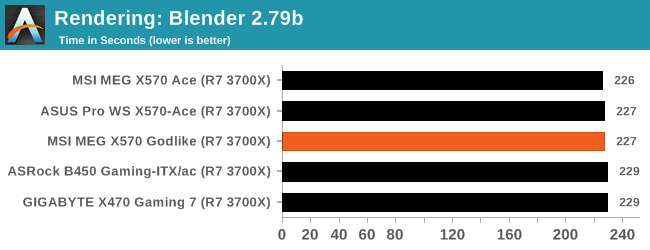
Streaming and Archival Video Transcoding - Handbrake 1.1.0
A popular open source tool, Handbrake is the anything-to-anything video conversion software that a number of people use as a reference point. The danger is always on version numbers and optimization, for example the latest versions of the software can take advantage of AVX-512 and OpenCL to accelerate certain types of transcoding and algorithms. The version we use here is a pure CPU play, with common transcoding variations.
We have split Handbrake up into several tests, using a Logitech C920 1080p60 native webcam recording (essentially a streamer recording), and convert them into two types of streaming formats and one for archival. The output settings used are:
- 720p60 at 6000 kbps constant bit rate, fast setting, high profile
- 1080p60 at 3500 kbps constant bit rate, faster setting, main profile
- 1080p60 HEVC at 3500 kbps variable bit rate, fast setting, main profile
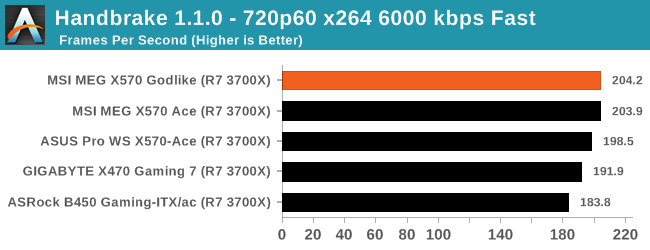
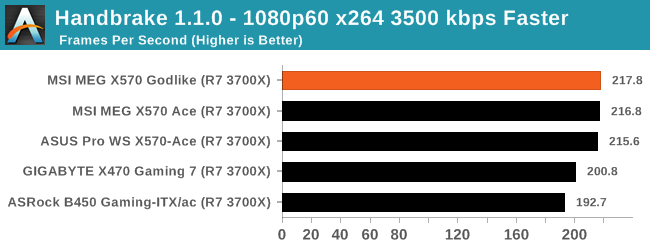
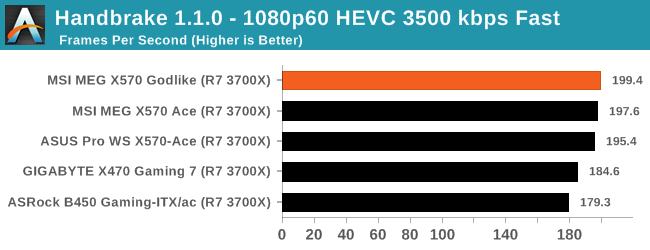
Rendering – POV-Ray 3.7.1: Ray Tracing - link
The Persistence of Vision Ray Tracer, or POV-Ray, is a freeware package for as the name suggests, ray tracing. It is a pure renderer, rather than modeling software, but the latest beta version contains a handy benchmark for stressing all processing threads on a platform. We have been using this test in motherboard reviews to test memory stability at various CPU speeds to good effect – if it passes the test, the IMC in the CPU is stable for a given CPU speed. As a CPU test, it runs for approximately 1-2 minutes on high-end platforms.
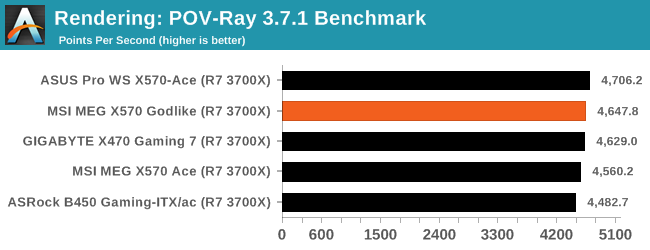
Compression – WinRAR 5.60b3: link
Our WinRAR test from 2013 is updated to the latest version of WinRAR at the start of 2014. We compress a set of 2867 files across 320 folders totaling 1.52 GB in size – 95% of these files are small typical website files, and the rest (90% of the size) are small 30-second 720p videos.
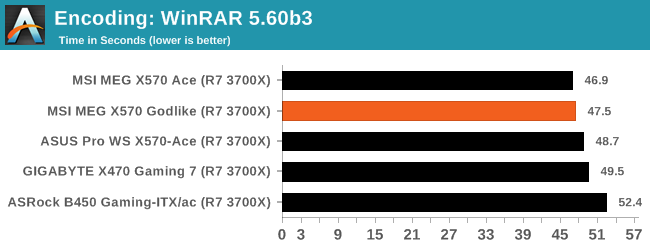
Synthetic – 7-Zip v1805: link
Out of our compression/decompression tool tests, 7-zip is the most requested and comes with a built-in benchmark. For our test suite, we’ve pulled the latest version of the software and we run the benchmark from the command line, reporting the compression, decompression, and a combined score.
It is noted in this benchmark that the latest multi-die processors have very bi-modal performance between compression and decompression, performing well in one and badly in the other. There are also discussions around how the Windows Scheduler is implementing every thread. As we get more results, it will be interesting to see how this plays out.
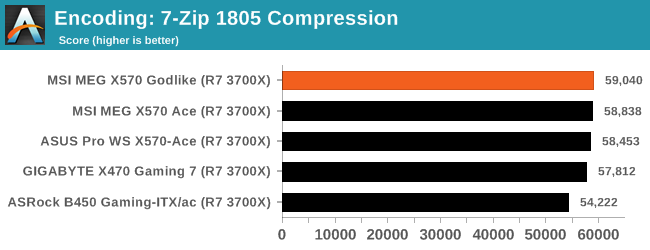
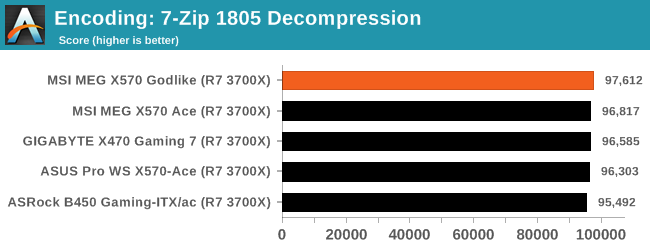
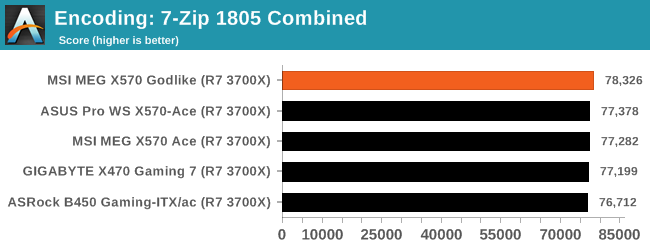
Point Calculations – 3D Movement Algorithm Test: link
3DPM is a self-penned benchmark, taking basic 3D movement algorithms used in Brownian Motion simulations and testing them for speed. High floating point performance, MHz, and IPC win in the single thread version, whereas the multithread version has to handle the threads and loves more cores. For a brief explanation of the platform agnostic coding behind this benchmark, see my forum post here.
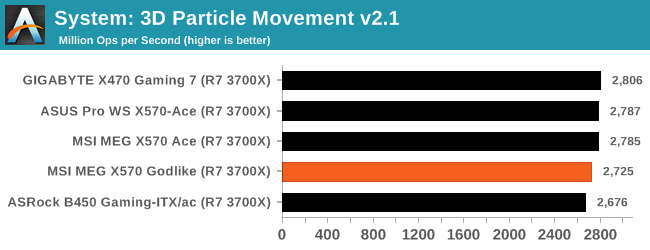
Neuron Simulation - DigiCortex v1.20: link
The newest benchmark in our suite is DigiCortex, a simulation of biologically plausible neural network circuits, and simulates activity of neurons and synapses. DigiCortex relies heavily on a mix of DRAM speed and computational throughput, indicating that systems which apply memory profiles properly should benefit and those that play fast and loose with overclocking settings might get some extra speed up. Results are taken during the steady-state period in a 32k neuron simulation and represented as a function of the ability to simulate in real time (1.000x equals real-time).
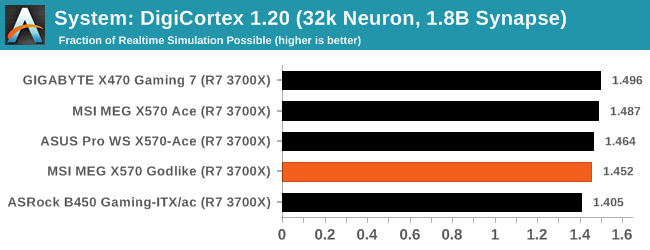










116 Comments
View All Comments
Oxford Guy - Thursday, August 29, 2019 - link
"As far as security issues they have both had their own issues over the years, although Intel has had a fair amount more."I don't think so. Intel's recent security track record is abysmal when compared with AMD's.
Qasar - Friday, August 30, 2019 - link
Sweetbabyjays the savings you are referring to for the MSI and Gigabyte boards, guess where it goes, the the HSF to cool that CPU, and remember, a 50 or 60 buck cooler, isnt going to cut it. you will need to get a mid high, to a high end cooler to keep that 9900k running at 4.8 ghz. and BTW... so what if the 9900k can hit 4.8 or 5 ghz.. big deal.. the Ryzen cpus are performing with in a few % of the intel equivent cpus while being 600+ MHz slower, all because the IPC is better then intels right now, once the ryzen cpus get their clocks higher, the gap, could flip flop... clock speed isnt the end all be all in performance, IPC is.. and AMD, for the time being, has the better IPC."
Then you say in another comment "they've won the performance and value games both at once." i never knew 10% less performance is better." it is when, again, the 10% deficit, is also at lower clocks compared it intel, as again.. IPC is better
Irata - Thursday, August 29, 2019 - link
First of all, there are many lower price options for X570.And to add to this, a high end Z390 motherboard is not cheaper - you can actually even spend more and if high Ghz is your aim, that is what you will need. Plus a high end ($$$) cooling solution.
Sweetbabyjays - Thursday, August 29, 2019 - link
True there are many X570 boards for cheaper, which in my opinion makes this board in particular, pointless. Spending $700 on an AM4 motherboard is in my opinion pure stupidity.The Z390 Godlike motherboard is available for $100 US cheaper. So a product for product comparison. Additionally, there are many other Silicon Lottery QVL Z390's that you can purchase for literally 1/3 of the price of this board. Furthermore, you can overclock a 9900k to 4.8 on pretty much any Z390/370 board.
If you're planning on getting your 3700x to 4.2GHz, you're not going to get there with a stock cooler, so you still need an expensive cooler.
AMD's main game is to be the value for money competitor, what i'm saying is a $700 motherboard at AM4 level literally takes that advantage and scrubs it. The only time that Zen 2 CPUs become the value option is when you need more than 8c/16t, or if you're going to go with an older AM4 chipset.
AshlayW - Thursday, August 29, 2019 - link
Then we both agree that this motherboard is pointless. It is, 700 bucks on this is a stupid thing, but when a decent X570 is 150-200 bucks, no problem. 3700X+X570 is hands down the better solution (read: also for gaming builds) than the 9900K+Z390 when all is considered.AMD doesn't have to be the "Value for money competitor" anymore, hon, they've won the performance and value games both at once. Ryzen is a premium brand now, and just happens to offer better value also. 3950X will render Intel's entire HEDT completely pointless, and 3900X already does half of it.
Sweetbabyjays - Thursday, August 29, 2019 - link
I totally agree that 3900x and 3950x really are the final nails in the X299 coffin.AshlayW - Thursday, August 29, 2019 - link
Or you could be a Smart consumer and get a B450 + Ryzen 9 3700X, for the same price as the 9900K alone, and have 90% the performance in every single scenario and having saved over a hundred dollars, considering you didn't have to buy the cooler, also? Oh, and the socket isn't dead-end and actually has an upgrade path.AshlayW - Thursday, August 29, 2019 - link
Ryzen 7*Sweetbabyjays - Thursday, August 29, 2019 - link
"B450 + Ryzen 7 3700X" I agree, this is a much more logical approach for most gamers and content creators on a budget.Oxford Guy - Thursday, August 29, 2019 - link
I'm also wondering why people ALWAYS push the 9900K instead of the 9700K to gamers, when 8 threads is enough for games and will be for long enough.